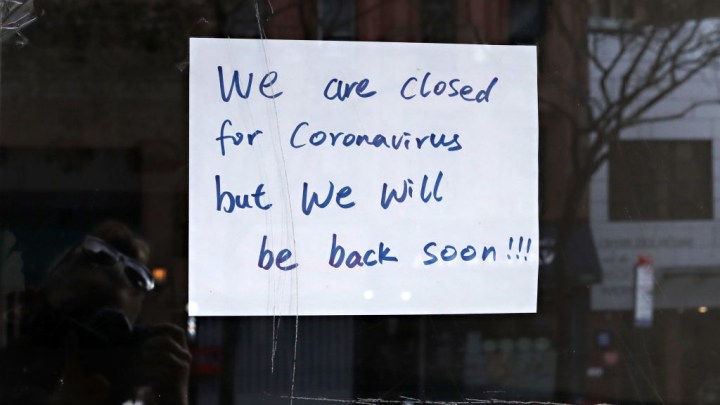
30 million have sought U.S. unemployment aid since COVID-19 hit

More than 3.8 million laid-off workers applied for unemployment benefits last week as the U.S. economy slid further into a crisis that is becoming the most devastating since the 1930s.
Roughly 30.3 million people have now filed for jobless aid in the six weeks since the coronavirus outbreak began forcing millions of employers to close their doors and slash their workforces. That is more people than live in the New York and Chicago metropolitan areas combined, and it’s by far the worst string of layoffs on record. It adds up to more than one in six American workers.
With more employers cutting payrolls to save money, economists have forecast that the unemployment rate for April could go as high as 20%. That would be the highest rate since it reached 25% during the Great Depression.
This week, the government estimated that the economy shrank at a 4.8% annual rate in the first three months of this year, the sharpest quarterly drop since the 2008 financial crisis. Yet the picture is likely to grow far worse: The economy is expected to contract in the April-June quarter by as much as 40% at an annual rate. No previous quarter has been anywhere near as weak since the government began keeping such records after World War II.
As businesses across the country have shut down and laid off tens of millions of workers, the economy has sunk into a near-paralysis in just a few weeks. Factories, hotels, restaurants, department stores, movie theaters and many small businesses are shuttered. Home sales are falling. Households are slashing spending. Consumer confidence is sinking.
With some signs that the viral outbreak may have plateaued at least in certain areas of the country, a few governors have taken tentative steps to begin reopening their economies. But surveys show that a large majority of Americans remain wary of returning to shopping, traveling and other normal economic activity. That suggests that many industries will struggle with diminished revenue for weeks or months to come and might be unable to rehire laid-off workers.
The Economic Policy Institute has calculated that about 70% of people who have filed for unemployment benefits since the virus struck have been approved. Applications from the rest may still be pending, or they might have been turned down. Some applicants may not have earned enough money in their previous jobs to qualify for unemployment benefits.
Thursday’s figures also showed that states have approved the benefit applications of nearly 18 million people. This figure is much lower than the total number of people who have sought unemployment aid since the virus struck, in part because it lags behind by one week. And not everyone who applies for benefits manages to receive them.
Americans’ confidence in the economy and in their future incomes has plunged, a sentiment that could slow the rebound once more states and cities allow businesses to open. Many consumers, whose spending drives the bulk of the economy, may be slow to begin shopping, traveling and eating out. Some will likely remain too fearful of contracting the virus. And local and state officials are likely to maintain limits on the number of people who can congregate in certain places at any one time.
Consumer confidence, as measured by the Conference Board, has plummeted to a six-year low, and its measure of how Americans regard the current economy fell by a record amount.
Nearly a fifth of Americans expect their incomes to fall in the next six months, the Conference Board found, the worst such reading in more than seven years. That reinforced the belief that Americans will remain cautious in the spending for months to come.
There’s a lot happening in the world. Through it all, Marketplace is here for you.
You rely on Marketplace to break down the world’s events and tell you how it affects you in a fact-based, approachable way. We rely on your financial support to keep making that possible.
Your donation today powers the independent journalism that you rely on. For just $5/month, you can help sustain Marketplace so we can keep reporting on the things that matter to you.


















